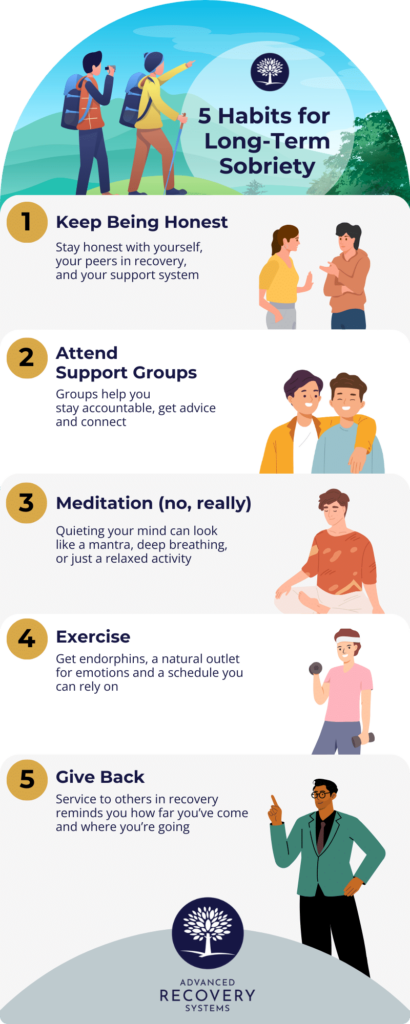Incorporate these things into your daily practice and you’ll be on your way to avoiding relapse and living asuccessful life in sobriety.
Getting through addiction treatment may be one of the hardest things you ever do.
It’s like learning how to do life all over again, but this time, you get an instruction manual. Once yougraduate from rehabit will be up to you to take what you’ve learned and make it work in the real world.
It can be done, but there are daily recovery behaviors you should practice that will help lead you to long-term sobriety. Incorporate these things into your daily practice and you’ll be on your way to avoiding relapse and living asuccessful life in sobriety.
1. Honesty
To be sober, you have to be rigorously honest with yourself and others. Chances are if you’ve been through rehab already, you’ve heard this phrase before.
Treatment Can Be Life Changing. Reach out today.
Whether you are struggling with addiction, mental health or both, our expert team is here to guide you every step of the way. Don’t wait— reach out today to take the first step toward taking control of your life.
When I went through the 12 steps the first time and heard that I had to be completely honest, my first thought was, “oh crap.” Being honest about everything wasn’t my forte, but it became a way of life in sobriety. It’s almost like being sober and being honest go hand-in-hand. When you embark on your new life after addiction treatment, it’s imperative you keep being honest.
Honesty will help keep you sober.
2. Attending support groups
Whether it’s the 12 step, SMART recovery, Refuge Recovery,Women for Sobriety, or any other of the countless addiction support groups that are available, I recommend you find one as soon as you leave rehab. This will keep you accountable to your sobriety and offer you a support group in your area where you live.
There’s nothing that supports long-term sobriety better than a sober support system. You’ll be able to meet others who have been through similar situations you have and are also recovering from addiction. If have a problem or struggle in the future, these are groups of people you can turn to.
3. Meditation
I’ll be honest, I never meditated in my life before getting sober. It wasn’t something I ever thought about or would consider because I didn’t think it worked. When I sober and learned about whatmeditationis and that it never has to be done perfectly, like many of us think, I gave it a shot.
It’s amazing the calmness and peace that comes through a short meditation. All you have to do is quiet the mind and everything becomes much more manageable. Lived meditation is just being in the moment and not wishing you were somewhere else or someone else.
These are key aspects to successfully living in long-term sobriety; using your coping mechanisms at the right time and asking for guidance through meditation.
4. Exercise
Another seemingly simple behavior that is imperative to long-term sobriety is exercise. Exercise was always a part of my life, but it was something I had to do, not something I wanted to do.
When I got sober exercise took on a whole new role.
It gives me natural endorphins that make me feel good. It’s also a healthy outlet for my emotions. It keeps me sane. It also helps keep me on a schedule. You’ll be more likely to succeed in sobriety if exercise is part of your recovery plan.
5. Giving back
You might hear this in 12 step meetings, “you have to give it away to keep it.” This means sobriety, and what you’ve learned,should be given back.
Helping others has been an integral part of my recovery.
When I am of service to others – whether it’s my blog readers, other 12 step group members, or chairing a meeting at a rehab, I always find ways to give back. This 100 percent helps keep me sober. It allows me to come in contact with others who need help or might benefit from hearing my story. It reminds me where I came from and where I’m going.
I find that being of service has been one component of my successful sobriety and I believe it will stay that way for years to come.
These daily recovery behaviors will help you stay on the path to lifelong sobriety. A successful recovery program is made up of many different elements and it looks different for everyone. Find what works for you and put your recovery plan into action.

Ready to build a sober routine?
Check out this 6-week guide to changing your drinking habits.







